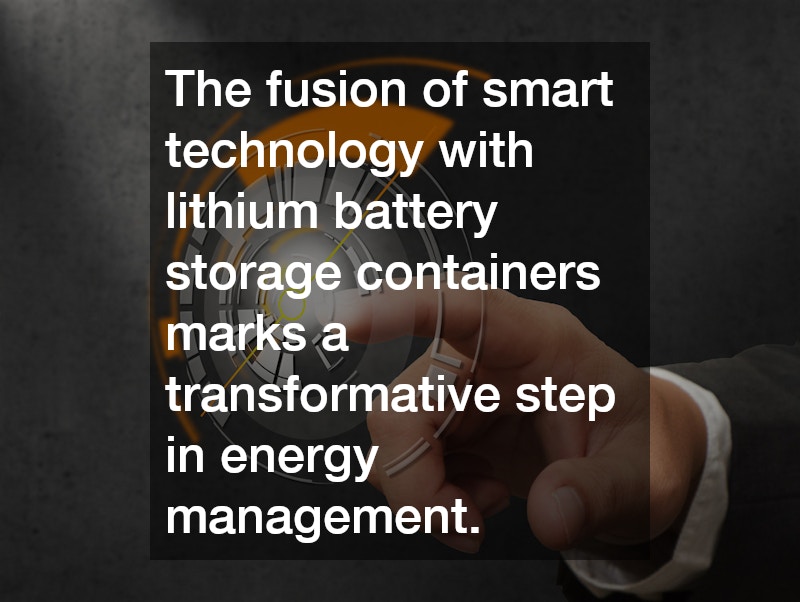As the demand for renewable energy, electric vehicles, and portable electronics surges, the role of lithium batteries becomes increasingly significant. These batteries offer impressive energy density and longevity, making them the backbone of many modern technologies. However, with such powerful energy storage comes a critical need for safety and efficiency in how these batteries are stored and managed. Enter the modern lithium battery storage container—an innovation that is evolving rapidly thanks to smart technology integration. This blog explores how the incorporation of advanced sensors, IoT capabilities, and AI-driven management systems in lithium battery storage containers is revolutionizing energy storage and management.
The Need for Smart Technology in Battery Storage
Lithium batteries, while efficient, pose unique challenges. They are sensitive to temperature fluctuations, prone to degradation if not properly managed, and, in rare cases, can present fire risks.
Traditional storage containers provided physical protection but lacked the ability to monitor or manage these risks proactively. With smart technology integration, lithium battery storage containers can now continuously monitor internal conditions, predict potential issues, and communicate data in real-time, enabling safer and more efficient battery management.
This shift toward “smart” storage containers addresses not only safety concerns but also enhances operational efficiency. By harnessing data and automated controls, organizations can extend battery life, reduce maintenance costs, and optimize performance across various applications—from grid storage to electric vehicles.
Key Smart Technologies Enhancing Lithium Battery Storage Containers
Modern lithium battery storage containers leverage several cutting-edge technologies to create intelligent, responsive systems.
Sensor Networks: Embedded sensors track temperature, humidity, voltage, and pressure inside the container. These sensors provide constant feedback to a central monitoring system, ensuring that batteries operate within safe parameters. Early detection of overheating or leaks can trigger automated safety protocols, such as activating cooling systems or isolating affected batteries to prevent escalation.
Internet of Things (IoT) Connectivity: IoT integration allows storage containers to communicate with central control platforms via wireless networks. This connectivity enables remote monitoring, data analytics, and predictive maintenance. Operators can access real-time data on battery health and container status from anywhere, allowing swift response to emerging issues.
Artificial Intelligence and Machine Learning: Advanced analytics powered by AI and machine learning algorithms analyze sensor data to predict battery degradation and failure risks. These insights enable proactive interventions, optimizing battery usage schedules and preventing unexpected downtime. Over time, AI systems learn from operational data, continuously improving storage conditions and management strategies.
Benefits of Smart Integration in Battery Storage
The infusion of smart technologies into lithium battery storage containers brings significant advantages:
Improved Safety: Continuous monitoring reduces risks associated with thermal runaway and other battery failures. Automated safety measures can act faster than human operators, preventing accidents before they occur.
Enhanced Efficiency: Real-time data allows for fine-tuning environmental conditions such as temperature and humidity, improving battery lifespan and performance. Optimized storage conditions translate to better energy retention and reduced replacement costs.
Remote Management: IoT connectivity empowers operators to monitor multiple storage sites from centralized dashboards, enabling streamlined logistics and resource allocation without on-site presence.
Data-Driven Maintenance: Predictive maintenance schedules reduce downtime and maintenance expenses by addressing potential issues early. This proactive approach extends battery and container life cycles.
Scalability: Smart containers can be easily integrated into larger energy storage networks. Their modular design and communication capabilities allow for flexible scaling in response to growing energy demands.
Applications Across Industries
Smart lithium battery storage containers are making waves in various sectors, supporting the transition to cleaner, more reliable energy systems.
Renewable Energy Storage: Solar and wind farms rely on battery storage to balance intermittent power generation. Smart containers ensure these batteries remain safe and efficient, maximizing clean energy availability.
Electric Vehicles (EVs): From manufacturing to deployment, EV batteries require secure storage. Smart containers protect these batteries during transport and maintenance, improving safety and readiness.
Data Centers: With growing demand for uninterrupted power, data centers use battery backup systems housed in smart containers to maintain operations during outages.
Industrial and Commercial Facilities: Smart containers support energy storage solutions that help facilities manage peak demand and reduce energy costs.
Future Trends in Smart Battery Storage Containers
The integration of smart technology in lithium battery storage containers is poised for further advancement. Future developments may include:
Blockchain for Security: Incorporating blockchain could secure data transmission and enhance trust in battery management systems, ensuring data integrity and preventing cyber threats.
Advanced Materials and Cooling: Combining smart sensors with new cooling materials will improve thermal management, further reducing risks of battery overheating.
Integration with Smart Grids: Enhanced communication between storage containers and smart grids will facilitate more efficient energy distribution and consumption.
Autonomous Management Systems: Fully automated containers capable of self-regulation and decision-making based on AI could minimize human intervention, driving operational efficiency to new heights.
Powering the Future with Smart Lithium Battery Storage Containers
The fusion of smart technology with lithium battery storage containers marks a transformative step in energy management. By enabling real-time monitoring, predictive analytics, and remote control, these advanced containers address safety concerns, improve operational efficiency, and support the growing demands of renewable energy, electric vehicles, and beyond.
As technology continues to evolve, smart lithium battery storage containers will become even more integral to sustainable and reliable energy infrastructures. Embracing these innovations today not only enhances safety and performance but also lays the groundwork for a smarter, cleaner energy future.

